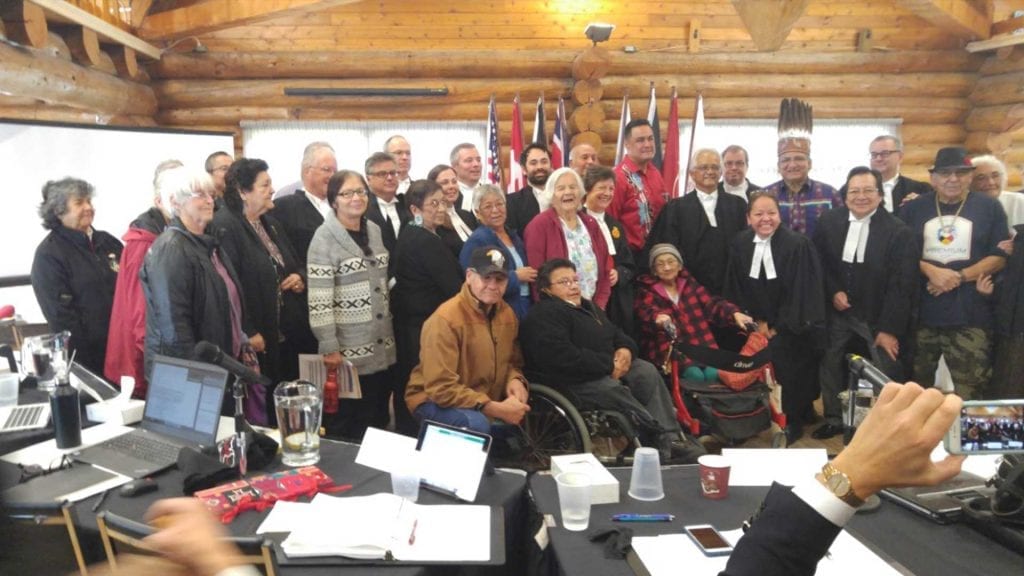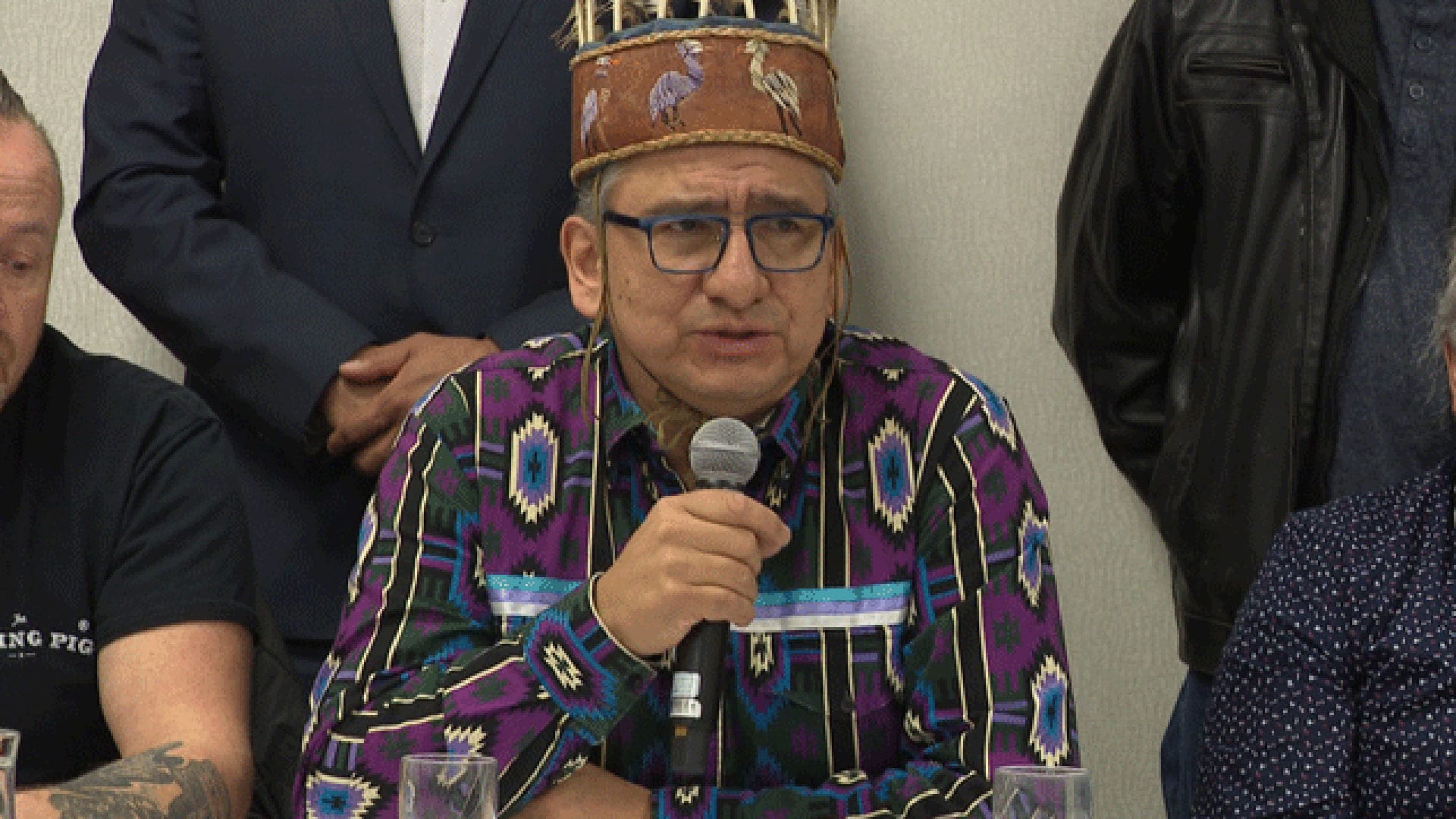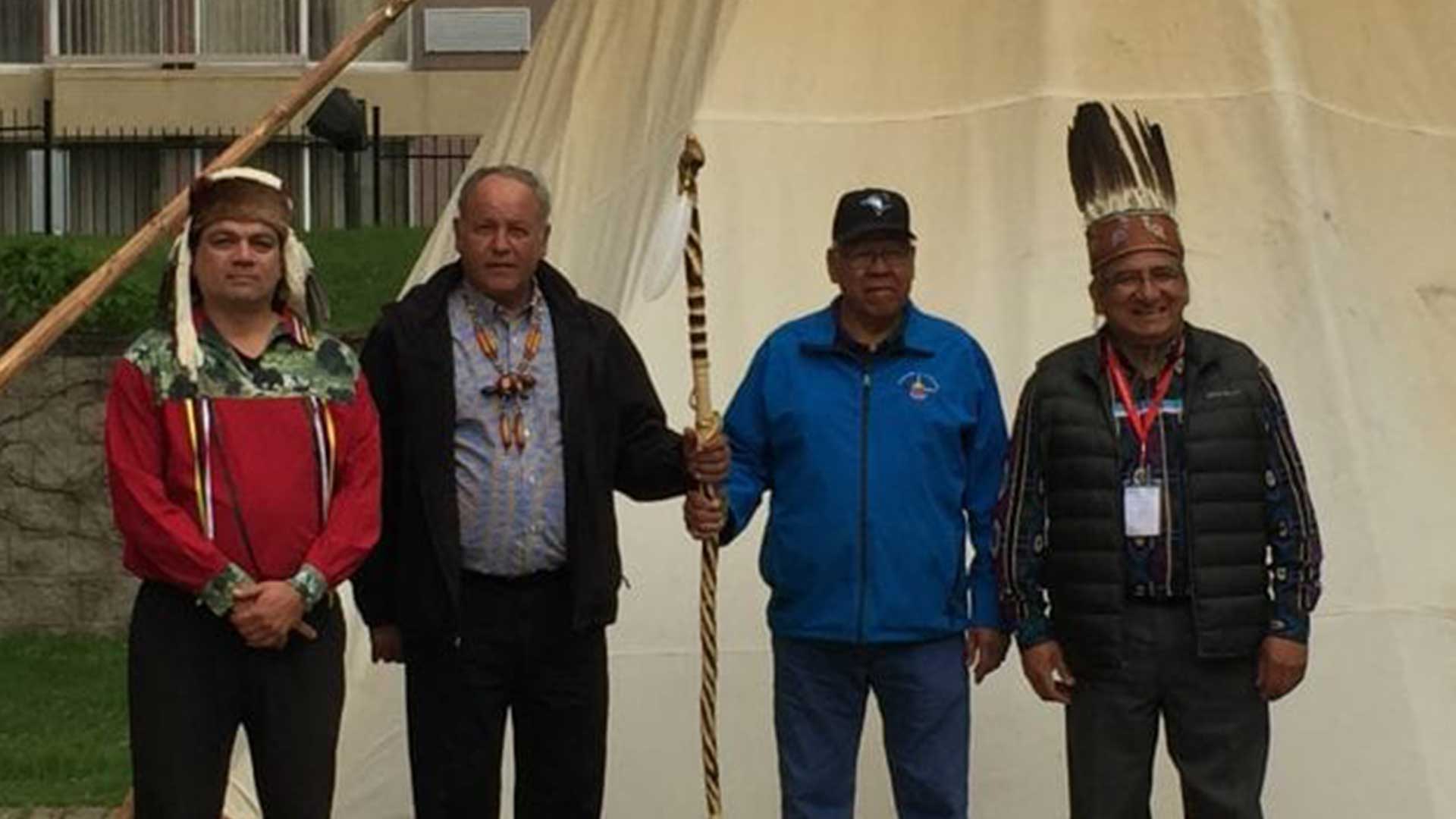
Justice Patricia Hennessy with lawyers and Anishinaabe elders in court at Garden River First Nation. Photo courtesy: Mike Restoule/Robinson Huron Treaty Trust
Provincial government lawyers are set to give opening statements in the Ontario Court of Appeal Tuesday morning in a bid to overturn a finding that the Crown must raise treaty annuities from $4 per person when economic conditions make it possible.
But chiefs speaking on behalf of upper Great Lakes Anishinaabeg say it’s not too late for Queen’s Park to reconsider.
“Stop wasting energy, time and money,” urged Batchewana First Nation Chief Dean Sayers during a press conference Monday.
“Let’s set that table, and let’s have a productive table on behalf of everybody that have agreed to live side by side and share the lands and resources. My people shouldn’t be living in poverty. My people shouldn’t have to suffer to the extent that they are.”
Sayers is one of the spokespeople for the Robinson Huron Treaty Litigation Fund, which was created to pursue the case by 21 Anishinaabe communities who are beneficiaries of the 1850 accord.
When the treaty was made, the Crown considered the territory north of lakes Superior and Huron to be “vast but sterile,” according to the 197-page decision. The Crown treasury also faced dwindling revenues which meant it couldn’t pay annuity amounts as high as past treaties, which chiefs were well aware of.

They devised what’s known as an “augmentation clause” or “escalator clause.” The Crown promised to raise the treaty annuity “from time to time” if the territory began producing enough wealth to enable the increase “without incurring loss.”
But the annuity hasn’t gone up since 1875, when it was set at $4 per person, even though the characterization of the territory as “notoriously barren and sterile” proved incorrect.
While the area contains vast timber and mineral wealth, which are under provincial jurisdiction, the federal government currently pays the annuity.
The third and final phase of the case could change this, as it would determine whether the provincial or federal Crown must pay and how much. Phases one and two have been decided in favour of the Anishinaabe.
Superior Court Justice Patricia Hennessy ruled the Crown must fulfill the treaty promise, which was that the annuity should reflect the value of the territory. She then concluded the case was not barred by statute of limitations or Crown immunity.
The status of stage three is now uncertain. Ontario is appealing stages one and two, and could potentially pursue those appeals to the high court if Queen’s Park suffers yet another loss.
Ogimaa Duke Peltier, who joined Sayers at the news conference, said a favourable ruling from the appellate court would send a strong message to Ontario that its arguments aren’t based in truth and justice.
“Through this stage one appeal, they are indicating that there was never an intention by Ontario to increase the annuity — which is disheartening to say the least,” said Peltier, who hails from Wiikwemkoong Unceded Territory on Manitoulin Island.
“I think that the courts will once again validate the earlier ruling in stage one and stage two and allow for a full accounting to take place to determine what the appropriate mechanisms of restitution should be.”

The chiefs said they are disappointed, befuddled and concerned by Ontario’s decision to draw out an already complex and costly lawsuit.
Sayers said he’s also “looking forward to the spin” he expects Queen’s Park lawyers will put on the Crown’s treaty obligations. He believes Ontarians and Canadians want their governments to resolve these issues in a good way.
“Your people expect you to sit at the table, provide mandates, stop playing these games,” said Sayers in a message directed at Ottawa and Toronto. “Give them mandates to negotiate and mandates to settle — or the people of Ontario might not like the outcome of stage three when a number may be prescribed for them.”
The federal government spends roughly $35 million per year on what it calls “Indigenous litigation,” but Canada has not appealed this case.
Peltier and Sayers said both Canada and Ontario have failed to provide their bureaucrats with mandates to actually sign a settlement.
The political landscape has been shifting since the ruling was handed down. Ontario changed governments from Liberal to Conservative, while Prime Minister Justin Trudeau’s Liberals won a second term in 2019 but only as a minority.
The phase two decision came down in 2020 amid the COVID-19 pandemic. Ottawa is now buzzing with election talk which could again delay any mandate to settle.
In any case, the Anishinaabeg are confident in their case. Their offer to negotiate — and save taxpayers some cash — is a standing one.
“Once we do win this stage one appeal, I would call on Ontario once again to abandon these appeals. It’s just a tactic. It’s a delay tactic. Get to the table,” said Sayers.
“The writing is on the wall. It’s been there. It’s based on fact. It’s based on truth. You can’t keep dragging your heels. You can’t keep holding up the process, Ontario.”
The Zoom court proceedings can be livestreamed here.









